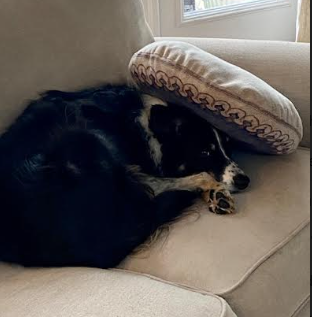As I type this, my dog is under my feet, in a dark office, with the door shut, in the basement, and I'm playing white noise. We are having a mild thunder storm.
When it comes to fearful dogs and loud noises like thunderstorms or fireworks, it can be a challenging situation for pet owners to handle. Dogs can exhibit various signs of fear and anxiety during storms, such as trembling, hiding, excessive barking, or even destructive behavior--mine recently shredded our bedspread!
If outside during a fear trigger--be it another dog, a loud vehicle or backfire, the rumble of thunder, or something you'd never consider a threat--please know your dog will run if at all possible. An escaped, lost, or hit dog, is not a scenario anyone wants. I had such a scenario that taught me a very valuable, and nearly catastrophic, lesson:
We took Pippa, our then new 10-week old puppy, onto a harbor cruise boat, because we wanted to expose her to all sorts of things to limit her fears (my own eye roll here!) All was going well, she was prancing around visiting people, wearing her collar and harness, getting all the snuggles and laughs. Then, as the boat left the harbor, it powered up, the sudden sound and vibration scared her. She bolted, running under my chair, entangling herself and tipping the chair; that frightened me causing me to yell out, and that scared her even more and she literally backed out of her harness! A loose, frantic puppy running around an open vessel, in Lake Michigan, was terrifying. At one point she jumped up on a ledge and had her feet over the edge of the cruise boat. If she had gone in, she would have been lost in the 40 degree water. Suffice it to say, I invested a hefty sum of money in a well-fitting slip-proof harness and have never suffered another incident. I also learned, in new situations, to get down on her level, hold her tightly initially, and let her ease into the situation or remove her if necessary.
As a responsible pet owner, it's essential to know a bit about dog fear, try to be prepared for anything, and to have few calming techniques at the ready. Depending upon the stressor, even these generic tricks may not be enough.
Understanding the Fear Trigger
First and foremost, it's crucial to understand that fear of loud noises in dogs is a common issue. According to the American Kennel Club, up to 50% of dogs show signs of fear during thunderstorms. This fear can be due to a combination of loud noises, changes in barometric pressure, static electricity, other environmental factors, and even some PTSD.
Personally, I've witnessed the degree of fear increase as dogs age. We got Pippa at 8 weeks old and kennel trained her with a noise machine playing, of all things sounds of a thunderstorm. She's never been yelled at or hit; always treated with kindness and compassion; gets plenty--excessive--activity; and has all the comforts a dog could ever hope for. We always felt confident leaving her, even when storms were predicted, as she never exhibited anxiety or fear. Until about a year ago. Now, at nearly nine years old, all it has to do is rain and she starts panting, circling, and eventually heads to the basement. The sound of a firework or gunshot will have her climbing the walls.
I've yet to have a vet, or anyone, thoroughly explain this sudden change to me. As I watch her age, I can only equate it to an elderly person and their desire to remain in known and quiet settings. Just my observation.
Creating a Safe Space
One effective way to help calm a fearful dog is to create a safe space for them. This can be a quiet room in the house (as far from the noise as possible), a cozy crate covered with a blanket or a den-like area where they feel secure, a bathtub with rug/blanket in it, or a dark basement office. Make sure this space is comfortable and familiar to your dog, with their favorite toys, blankets, and treats. A tv, radio, or white noise machine can also help mask sounds.
Using Calming Techniques
There are various calming techniques you can try to help your dog relax during a storm. As mentioned, playing soothing music or white noise can help drown out the loud noises of the storm or fireworks. You can also use calming pheromone sprays or diffusers to create a sense of security for your dog. Additionally, gentle massage or pressure wraps like Thundershirts can provide comfort and reduce anxiety. Caveat though: if your dog is smart, bringing out the Thundershirt can actually be anxiety inducing if he/she remembers putting it on during stressful situations. We felt ours was causing more harm than good because Pippa would begin stressing as soon as she saw it, even though the storm may be an hour away!
If it's a mild stressor, our girl responds to us sitting at her level, speaking to her in soothing tones, massaging her ears, and at times simply holding her firmly with our arms wrapped around her.
Seeking Medical and/or Professional Help
We keep dog calming chews containing a low-dose of melatonin on hand at all times. We often give Pippa one at bedtime, especially if she's had a very active day and may have muscle aches at night to cause restlessness. However, they are primarily for anxiety. We give her a dose whenever we know a storm is approaching, during hunting season, and the two weeks or so surrounding 4th of July. We also administer them before road trips and whenever she is sleeping somewhere besides home.
Melatonin chews are great for minor disruptions, we found they have zero effect once her fear has kicked in or the stressor is extreme.
Some people administer a small dose of Benadryl, but I'd refrain from this without prior conversation with your vet.
If your dog's fear of loud noises during storms or fireworks is severe and impacting their quality of life--like Pippa's--it may be beneficial to seek professional help. A veterinarian or a certified dog behaviorist can provide guidance on behavior modification techniques, medication options, or other interventions to help your dog cope with their fear.
Sadly, with the ridiculous "fireworks" that sounded like dynamite and shook our house for four days straight, we had to resort to prescription medication. If the people causing these deplorable booms could see our dog so drugged she cannot stand straight, perhaps they'd understand the cost of their enjoyment!
Be Your Dog's Support System
By understanding your fearful dog's behavior during loud noises and implementing calming strategies, you can help them feel more secure and comfortable during these challenging times.
Remember to remain patient, consistent, and supportive to help your furry friend navigate their fear with confidence. This is not always easy when you're watching your pet suffer at the hands of others, but swallow it down and be there for them. Deal with the injustice and ruined bedspreads later!




Share and get 15% off!
Simply share this product on one of the following social networks and you will unlock 15% off!